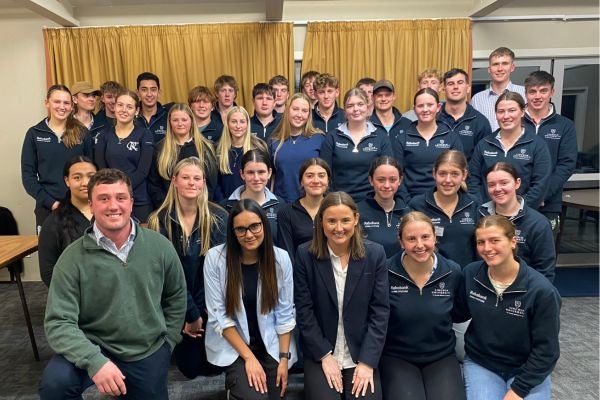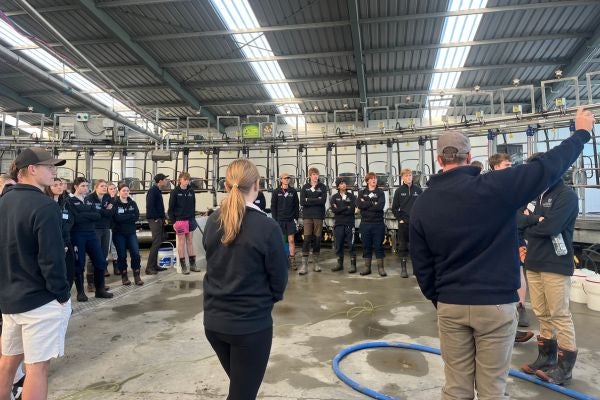Two dozen high school students from across New Zealand have recently completed a three-day live-in programme to learn about career pathways in the food production supply chain.
Held from 7-9 July, the all-expenses-paid Farm2Future educational programme, which is sponsored by Rabobank, was attended by 24 Year 12 students from 20 different high schools across New Zealand. The programme took in visits to a range of agribusiness operations across the Canterbury region including sheep & beef, dairy and sheep milking operations, Meadow Mushrooms, Foodstuffs, LeaderBrand, and PGG Wrightson’s. The programme also featured a panel discussion with several young agribusiness professionals talking about their roles in the sector.

The 2024 Farm2Future Students
This was the third edition of the Farm2Future programme (previously FoodX) with the prior programmes having taken place in 2019 and 2023. The initial idea for the programme was developed by the Rabobank Upper South Island Client Council – a group of Rabobank clients who work with the bank to help address key agricultural industry challenges – after they identified a need for more promotion of agri industry careers among secondary school students.
All three of the programmes have been run in conjunction with land-based education specialist Te Whare Wānaka o Aoraki Lincoln University.
Rabobank Upper South Island Client Council member Ed Tapp said the programme took in visits to a wide array of agribusiness operations across the food supply chain providing attendees with an insight into the journey food products took from paddock to plate.
“The goal of the programme was to give participants a greater appreciation of the huge number of career opportunities across the food and agri value chain, and I think we managed to give the students a really good taste of what the sector has to offer,” he said.
Mr Tapp said while several of the participants had grown up on farms, about half were from urban backgrounds and had no agricultural experience at all.
“Many young New Zealanders who live in urban centres don’t have strong links to the agricultural sector, and it’s essential that more work is done to further develop the urban-rural connection,” he said.

Students visit Rakaia Island dairy farm
“This programme is one of the things the Upper South Island Rabobank Client Council is doing to further build this connection, and one of the key messages we tried to instil into the students was that you don’t need to come from a farming family to have a successful career in agriculture.”
Programme attendee Brooke Cooper from Rangi Ruru Girls’ School in Christchurch said the camp had altered her perspective. The 16-year-old said she had planned to study agriculture at Lincoln, but her experiences on the programme had changed her mind and she was now intending to enrol to study food sciences.
“I wasn’t sure what option to go with. This camp really opened my eyes up,” she said.
After hearing from the panel, Brooke said she became aware of just how many different roles there were in the industry.
“The panellists had so many cool stories. I guess I never had anybody run me through all the career options in the sector before,” she said.
Another attendee, 16-year-old Ben Morris from Hamilton Boys’ High School in the Waikato, said the camp took him “all over the place” and that he’d learnt so much.
“I got a far better perspective of what actually happens at different agribusiness operations,” he said.
“I grew up on a dairy farm so have a bit of knowledge about the sector, but I had no idea just how large the agricultural industry was. It was all really interesting.”
